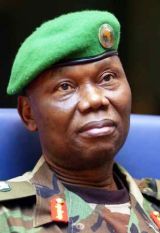Sudan’s Darfur rebel claims of govt raids cast shadow on peace talks
By DANIEL BALINT-KURTI, Associated Press Writer
ABUJA, Nigeria, Oct 27, 2004 (AP) — Rebels accused Sudan’s government of launching fresh bombing raids in the troubled Darfur region that killed 10 people, dealing another blow to peace talks in Nigeria’s capital that have so far failed on even the most basic point — setting an agenda.

|
|
Nigeria’s General Festus Okonkwo, the commander of the African Union’s peace keeping force in Sudan’s Darfur region, attends Sudan peace talks in Abuja, Nigeria in this picture taken October 26, 2004. |
Lt. Gen. Mohammed Ismail, the deputy chief of staff of the Sudanese army, denied the rebels’ accusations, saying there had been no fresh violence in the eastern Darfur town of Allaiat, a key base of the rebel Sudan Liberation Army.
SLA spokesman Mahgoub Hussain said government forces began bombing the town early Tuesday and air-raids continued Wednesday.
“Until now they are bombing,” Hussain said, just before talks resumed Wednesday in Abuja.
He said the dead included “about 10 civilians, including one lady who was pregnant.”
Both sides reported fighting for several days in and around Allaiat, and rebels said at least 7,000 people had been displaced. Sudan’s army said then they were only defending their positions. Both the Sudan Liberation Army and the Justice and Equality Movement have bases near Allaiat.
The fresh violence was sure to cast a shadow over the third day of talks in Abuja, where about 100 delegates gathered around a large oval table at an international conference center.
Talks broke off early Wednesday, after the African Union failed to get the two sides to talk about a long-term political solution for Darfur. Sudan Liberation Army spokesman Mahgoub Hussain said his group wanted to see an agenda for any political discussions, and needed more time to prepare its own position, before agreeing to face-to-face talks with the government.
As soon as the talks started, the blockage became apparent, and then the African Union said it would need to spend the rest of the afternoon mediating with rebel groups on another topic: security.
Discussions on security had stalled for similar reasons earlier in the week, and the African Union is talking with both sides separately to iron out an agenda.
An earlier round of peace talks in Nigeria ended without agreement in September, after rebels refused to sign a humanitarian accord giving aid organizations wider access to refugees. Rebels insist they will not sign the already-drafted accord without an accompanying security agreement.
Speaking in Berlin, German Foreign Minister Joschka Fischer said it was important for the international community to “encourage and support the African Union’s efforts wherever we can.”
However, he cautioned that “we know today already that the underlying conflict won’t be solved with an end to the violence in Darfur — we face a lengthy peace process in which difficult conflicts of interest, including access to the country’s economic resources, will have to be addressed.”
The crisis in Sudan’s western region began in February 2003 when rebels rose up against the Arab-dominated government, claiming discrimination in the distribution of scarce resources. Pro-government militias called Janjaweed reacted by attacking Darfur villages.
The United Nations has called Darfur the world’s worst humanitarian crisis and said it has claimed 70,000 lives since March — mostly through disease and hunger — while 1.5 million have fled their homes since February 2003. No reliable figures are available for those killed by violence.
A key sticking point in reaching a security deal is a government demand that insurgents disarm. The Sudan Liberation Army and a second rebel group, the Justice and Equality Movement, insist the Janjaweed must be disarmed first.
Hussain said the Sudan Liberation Army is also demanding that Sudanese government soldiers be grouped together at bases in the El-Geneina, El-Fasher and Nyala, the capitals of the provinces of West, North and South Darfur respectively.
Nearly 400 Nigerian soldiers are due to fly to Sudan’s violence-wracked Darfur region on Thursday to bolster an African Union peacekeeping force that’s supposed to grow to more than 3,000 troops.
Nigerian army spokesman Col. Mohammed Yusuf said 392 Nigerian troops would join 390 African Union peacekeepers already in Darfur, 155 of which are Nigerian.
